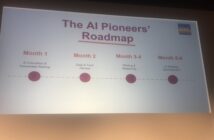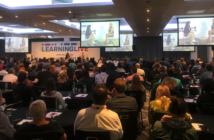Next week, elearning guru Tom Kuhlmann will be in London to deliver a masterclass on how to be a rapid elearning pro. Ahead of his visit, LearnPatch got to ask him a few questions about elearning, his favourite tech and what he would have been if he hadn’t have been an elearning professional.
With the consumerisation of tech and the expectations that come with that, are there new skills elearning professionals need to be developing to stay ahead of the curve?
Technology is always a solution to something else. So the first thing is to step away from the solution. In a general sense, elearning is about telling a story. It’s the story of “how to-“ So the better you are at telling the story, the better you’ll be at staying ahead of the game, especially since so many of the courses built are mostly limited to sharing information.
With that said, elearning professionals should understand good graphic design (and have some decent skills) and be curious about what’s new. That keeps them abreast of the latest technology and trends that they can use to tell their stories.
What technology most excites you now and how could that be used in elearning?
Since I work for Articulate, this will sound kind of biased, but I really love Storyline. I’m not a programmer. I’ve always had the luxury of having programmes help me flesh out my ideas. But with Storyline I can do a lot that I couldn’t do a few years ago. There are many days where I sit at my desk and try out ideas. In the past that wouldn’t have been possible. But today I can do some of those things in minutes. The fact that I can convert any presentation slide to a drag and drop interaction in about 30 seconds still blows me away. So for what I do on a day-to-day basis, I have to say I really am diggin’ Storyline.
As far as other things I love to play with all of the content creation apps on the iPad. I used to do video production, back when it was all analogue. That stuff took forever. Today I can use my iPad to create all sorts of video-based products with effects and decent editing. In many ways, any of those content creating apps can be output and used to augment rapid elearning content.
Can you see a day when elearning as we know it ceases to exist ie it is woven into other comms/technology.
No. E-learning isn’t one thing. It’s a bunch of things. I think there are parts of what we call elearning today that will be integrated into other tools. Communities are a great example. Instead of building big bloated training programs, organizations can switch to more active social communities where peer groups can share, teach, and learn. For just-in-time or point-or-sale training, perhaps simple mobile courses/information makes more sense than what we do currently. So in that perspective elearning will be integrated into different technologies and tools.
On the other hand, there’s a lot of elearning that’s all about messaging and pushing out information. If anything, technology is creating a whole lot more information and it’s getting harder to manage it. So there’ll always be the need for the curator (trainer) to package the information and share it. Elearning as we do it now is a viable solution.
And then of course, the big engine for elearning is compliance training. Most governments do not find a way to make themselves smaller. So as government and its myriad of regulations increase, so should our expectations of an increased demand for elearning. From that view, we in the industry should be well employed.
You run a thriving community. How important is that to your work?
I’m not sure how much we run as we are the beneficiaries of an industry that attracts people who are generally curious and like to teach and share. What we’ve done is created one place for them to do that.
In a general sense, community is important to build your practice. Most people like to draw from the community’s artifacts. They benefit from the conversation and tips and tricks. They love the downloads and free templates. And those things are all valuable. But to really improve your craft requires being an active participant in the community. It means sharing and learning from each other.
For our industry it’s very critical because most elearning people tend to work in small teams or in silos. They don’t have mentors at work. Or people on whom they can bounce ideas. I see the community as an extension of the cubicle. It’s a way to share and get feedback. It’s also a great way to network with like-minded people.
Going back to my work, I find it a privilege to connect with so many bright people, from all over the world, who are building all sorts of courses. It keeps me honest and in touch with the realities of elearning development and off of my soap box about what elearning should or shouldn’t be.
What tech do you use currently – mobile, tablet, PC, phone, gaming etc?
I’m a gadget guy. So I play around with gadgets and then sell them right away so I can get most of my money back. This promotes a healthy marriage. I’m actually not big on mobile communication, but love all of the apps and what the smart phones can do today. I don’t like to be connected 24 hours a day. I still have my old Tablet PC which I use to do drawing and take notes. Big fan of Dropbox and its collaborative capabilities. I am sure that my community team gets annoyed with me always playing around with apps and wanting to try new things. We still haven’t figured out how to uninstall Yuuguu. I think it will be with me till death.
If you weren’t an elearning pro what would you have been?
Assuming I had the skill, I’d be a boxer. But currently there’s little demand for non-skilled, overweight, middle-aged boxers. And what demand exists has been consumed by Audley Harrison.
Actually, I’ve jotted down notes for all sorts of book ideas, movies, and TV shows. My best friend and I have actually come up with a funny idea for a sitcom and I outlined an idea for a completely new type of interactive game show. I just need an agent and waiting for my Articulate stock options to materialize. So if elearning wasn’t my gig, and I didn’t need to worry about making money, I’d focus on one of those things.
- To find out more about Tom’s masterclass and to book a place, visit the Charity Learning Consortium website.



